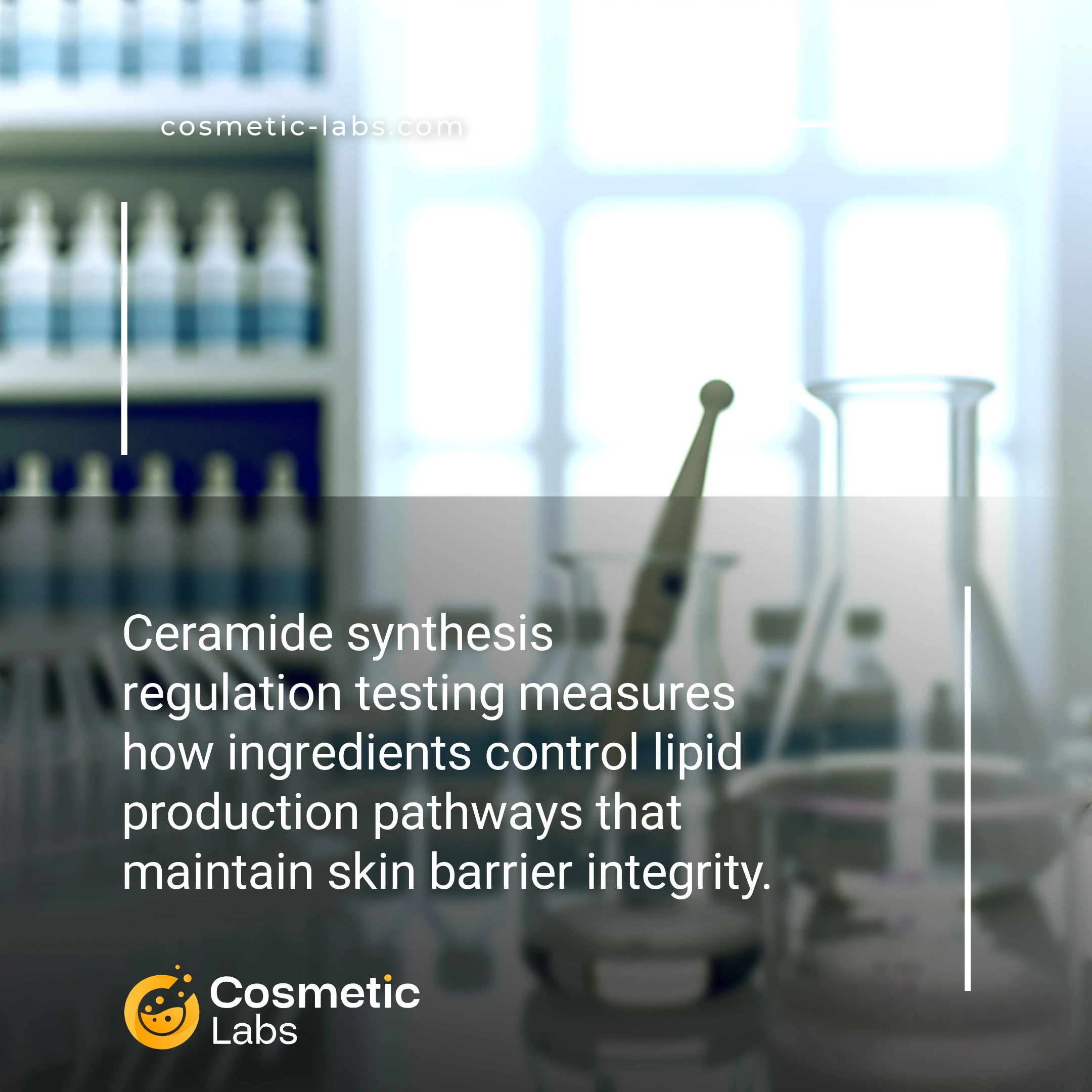Ceramide Synthesis Testing for Skin Barrier Function Labs

What is Ceramide synthesis regulation?
Ceramide synthesis regulation testing measures how cosmetic ingredients influence the skin’s natural production of ceramides, the lipid molecules that maintain barrier integrity. Labs use specialized assays to track ceramide biosynthesis pathways, including sphingomyelin deacylase activity and de novo ceramide formation rates. This testing reveals whether your formulation enhances the skin’s ability to self-repair its protective barrier—a key differentiator for anti-aging and sensitive skin products that goes beyond simple moisturization claims.
Why do you need this service?
Cosmetic labs use ceramide synthesis pathway analysis to validate anti-aging serums and moisturizers before market launch, measuring how formulations boost natural lipid production in reconstructed skin models. Teams also apply these protocols to troubleshoot barrier repair claims when products fail consumer testing, identifying which active ingredients actually stimulate ceramide biosynthesis versus those that merely deliver temporary hydration effects.
Who provides Ceramide synthesis regulation services?
All cosmetic labs providing Ceramide synthesis regulation services
Ceramide Synthesis Regulation Testing for Barrier Function Assessment
Ceramide production pathways directly impact skin barrier integrity, making ceramide synthesis regulation testing a critical component of barrier function evaluation. Labs on our platform measure how active ingredients influence ceramide biosynthesis to predict product efficacy in strengthening the skin’s protective barrier.
Enzymatic Pathway Analysis
Testing labs evaluate key enzymes in the ceramide synthesis cascade, including serine palmitoyltransferase and ceramide synthase activity. These measurements reveal how formulations affect the skin’s natural ceramide production capacity. Labs typically run assays on reconstructed skin models or cell cultures to track enzyme expression levels.
Standard testing protocols include:
- Enzyme activity quantification at 24, 48, and 72-hour intervals
- Gene expression analysis for ceramide synthesis enzymes
- Lipid profiling to identify specific ceramide species produced
Barrier Recovery Kinetics
Labs measure how quickly ceramide levels restore after barrier disruption to assess product performance. This testing involves creating controlled barrier damage, then monitoring ceramide replenishment rates with and without test products. The data shows whether ingredients accelerate natural repair processes.
Recovery testing typically measures:
- Baseline ceramide content before disruption
- Post-disruption ceramide depletion levels
- Recovery timeline with treatment application
Connect with specialized labs through our platform to access ceramide synthesis testing that validates your barrier-strengthening claims with precise molecular data.
Applications of Ceramide Synthesis Regulation Testing in Barrier Function Assessment
Cosmetic labs use ceramide synthesis regulation testing to validate skin barrier enhancement claims and optimize formulation performance across product categories.
Anti-Aging Product Development
Labs measure ceramide production pathways to validate anti-aging formulations targeting barrier repair. Testing protocols evaluate how ingredients like niacinamide and retinoids influence ceramide biosynthesis enzymes over 28-day treatment periods.
These assessments track serine palmitoyltransferase activity and ceramide synthase expression levels. Results help brands substantiate claims about barrier restoration and moisture retention improvements of 15-30% in clinical studies.
| Test Parameter | Measurement Method | Typical Timeline | Key Outcome |
|---|---|---|---|
| Ceramide Synthase Activity | Enzyme assay analysis | 7-14 days | Synthesis rate quantification |
| Barrier Lipid Composition | Lipidomics profiling | 14-28 days | Ceramide class distribution |
| Transepidermal Water Loss | TEWL measurement | 24-72 hours | Barrier function assessment |
Sensitive Skin Formulation Testing
Testing services evaluate how gentle cleansers and moisturizers support ceramide production in compromised skin models. Labs use reconstructed epidermis models to assess formulation impact on barrier lipid synthesis without irritation.
These studies measure ceramide precursor availability and enzymatic activity under stress conditions. Data supports product positioning for sensitive skin markets and helps optimize ingredient concentrations for maximum barrier benefits.
Contact specialized cosmetic labs on our platform to access ceramide synthesis regulation testing services tailored to your product development needs.